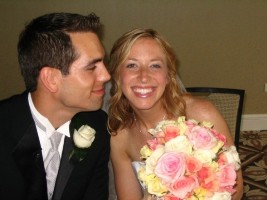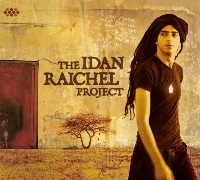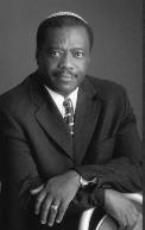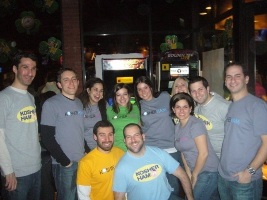The Godfather
Permanent link

Alyssa and Joe on their wedding day
We had been dating for six months when I decided it was time for Joe and I to have “the talk.” We sat on his couch for a long time, going through the familiar pattern of “What’s wrong?” and “Nothing” and silence before I was able to spit it out.
“I want to raise my children Jewish.”
What a load to lay on the new (Catholic) boyfriend. I skipped right through the talk of getting married and jumped right ahead to the babies. And not only was I bringing up our future children, I was asking him to commit to making Jewish babies. I figured I’d be logging onto JDate when I got home.
But Joe surprised me that night. He had already given the topic a lot of thought.
Joseph John Latala III, graduate of St. Raymond’s elementary school and Marquette University, committed to raising a Jewish family.
We got engaged a year later. We participated in interfaith group sessions and a Judaism 101 class. We discussed our plans with a rabbi and priest. We had a beautiful Jew-ish wedding, with a priest on the platform for good measure. Our Ketubah is signed by both Rabbi Sternfield and Father Cimarrusti, and is proudly displayed in our apartment.

Alyssa and Joe on their honeymoon in Riviera Maya, Mexico
And yet, despite Joe’s sincere affection for lox and kugel, his ability to spout the occasional Yiddish word (that would make any Jewish grandma proud) and his completely unselfish commitment to raise his children in a religion other than his own—I worry.
The fact is, as much as he accepts and even enjoys Judaism, Joe isn’t Jewish.
This became startlingly evident after dinner a few weeks ago, when talk turned to my brother Andy’s upcoming move to San Francisco. Andy expressed sadness that he would not get to spend as much time with his future nieces and nephews. This prompted Joe to say, “Well, I guess that takes him off the shortlist for godfather.”
Had I replied by saying, “I guess you’re right,” the conversation would have ended there. But the thought of my Jewish children having a godfather just felt so wrong. Joe’s totally offhand comment was shocking to me—and suddenly my head was spinning with questions.
Does Joe want our children to go to church with his parents every Easter? Does he know that I want to start special Shabbat traditions with our children? Will he want to have a Christmas tree in our home? Will he make us sing carols?
After fighting about the godfather issue that night for quite awhile, and not coming to any mutually agreeable solution, we let it go for the time being. But the issue hasn’t been forgotten, and it makes me wonder what other expectations each of us have that might be a surprise for the other.
My suggestion to honor the prospective godfather by calling him “super fun uncle” was soundly dismissed. Joe’s idea of asking someone to serve as godfather and then not really telling anyone about it seems a bit silly. We turned to the Internet for ideas, where we stumbled upon a page about the role of the godparent, or Sandek, in Judaism.
As it turns out, Judaism does in fact recognize a godparent, though in a slightly different sense than the traditional Christian godparent. Still, with a little more research, we hope to be able to honor someone in a way that is respectful of both of our religious backgrounds.
But we realize we may not always be that lucky—no matter how much research we do, we’re unlikely to find a Jewish Christmas carol or a place for Easter in Judaism. Despite our blanket commitment to raise a Jewish family, we still have different ideas about what exactly a Jewish family is, and how our family will fit into that mold.
The more we talk and ask each other questions, the more apparent it becomes that we may have to make our own mold. We fight at times but we try not to take ourselves too seriously. In the name of compromise, Joe asked me if it would be ok if our (future) dog is Catholic. I can’t argue with that.
Despite our dog’s religion, Joe has already made up his mind about her name—Kugel Latala.







.jpg)



